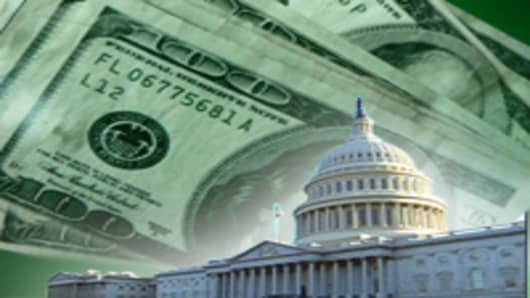The fate of a $700 billion Wall Street bailout remained unclear as a White House meeting of both parties ended without an agreement and some participants said talks had hit a major snag and may even be dead.
A person close to presidential candidate John McCain said "there is no deal"—a sentiment echoed by sources close to some Democrats involved in the negotiations.
- Credit Markets Frozen: 'No One Is Trading'
- Banks Need Another $500 Billion: Gross
The uncertainty followed a turbulent day in Washington, with some officials asserting that an agreement in principle had been reached, only to be contradicted moments later by other lawmakers.
The source close to McCain told CNBC that the agreement as it has been described publicly by Congressional and Senate staffers is "dead." However, McCain will work with Congressional staffers tonight to craft a deal, the source said.
Meanwhile, a source close to Democrats in the negotiations described the deal late Thursday as "cratering." The Democrats also plan to continue work into the night, the source said.
President Bush convened the meeting at the White House Thursday afternoon to hammer out an agreement on the bailout. The president urged lawmakers to work out a deal soon.
"We're in a serious economic crisis in the country if we don't pass a piece of legislation," Bush said at the beginning of the meeting. "We know we've got to get something done as quickly as possible. My hope is that we can reach an agreement very shortly."
The president was flanked by Democratic and Republican House and Senate leaders as well as the two presidential candidates, Sens. John McCain and Barack Obama.
In a dramatic turn, GOP Sen. Richard Shelby emerged from the White House meeting to say: "I don't believe we have an agreement."
- Watch Shelby's White House remarks
But in a subsequent interview on CNBC, GOP Rep. Peter King of New York said that Shelby may have been too hasty in saying there was no deal. "I wouldn't say that at all," King said.
Republican Sen. Lamar Alexander also told CNBC that at least 40 of the 49 Republican senators will back the bailout.
In the earlier CNBC interview, Shelby said he would raise several objections to the plan at the White House meeting.
"I have my doubts," the Alabama senator said. "I don't know this will solve all the problems in the economy."
Shelby's comments came after House GOP leader Rep. John Boehner of Ohio, said his party has not reached a deal yet on the bailout plan.
"I am encouraged by the bipartisan progress," Boehner said in a statement. But "House Republicans have not agreed to any plan at this point."
Though no agreement has been reached, there are several key provisions that are being discussed. They include:
- The $700 billion rescue fund would be made available in several installments, starting with $250 billion followed by $100 billion when the president certifies a financial emergency continues and another $350 billion in May.
- Government would get warrants for equity in participating companies as a way of protecting taxpayers.
- Restrictions on chief executive compensation at companies that participate.
- Two oversight boards would be formed—one with congressional representation, another would have the power to undo decisions by the Treasury Secretary.
- The Treasury Secretary would be prohibited from acting in an arbitrary or capricious manner or any way inconsistent with existing law.
- Regular, detailed reports would be made to Congress disclosing exercise of the Treasury Secretary's authority.
- An independent inspector general would be set up to monitor the use of the Treasury Secretary's authority.
- The Government Accountability Office would be required to perform audits to ensure proper use of funds, appropriate internal controls, and to prevent waste, fraud, and abuse.
- Maximize and coordinate efforts to modify mortgages for homeowners at risk of foreclosure.
- Loan modifications would be required for mortgages owned or controlled by the federal government.
- A percentage of future profits from the bailout fund would be made available to the Affordable Housing Fund and the Capital Magnet Fund to meet America's housing needs.
—On-Air Editor Charles Gasparino and Reuters contributed to this report
For Investors
- What the Pros Say: Buy a Mattress!
- Cramer's Web Exclusive Picks/Pans
- Web Extra: Should You Sell Yahoo?
- Trading the Bailout: Buy Best in Banks
- Financials to Buy Now: ETFs and Exchanges
- Wait Until Short-Sale Ban Ends
- Watch What Buffett Is Doing: Pros
- Money Market Freeze Needs to Be Fixed
- S&P to Fall Another 40%: Analyst


